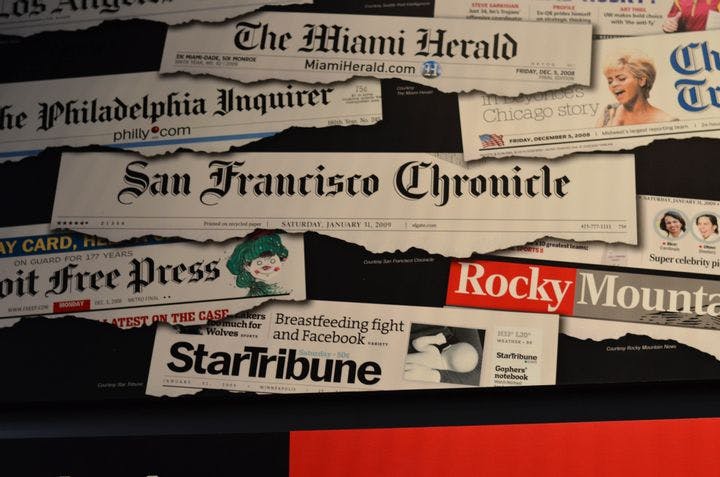Summer 2008
Dead Tree Scrolls
– Stephen Bates
Stephen Bates examines the hard realities of modern-day journalism.
“Newspapers are still far from dead, but the language of the obituary is creeping in,” pronounces the Project for Excellence in Journalism in its 2008 State of the News Media report. While the audience has migrated to the Web—the top 10 news sites account for 30 percent of all Web traffic—ad dollars haven’t followed. In particular, newspapers have lost lucrative classified ads to Craigslist, Monster.com, and other non-news websites. As a result, stock prices for newspaper companies have dropped more than 40 percent since 2005. Network news divisions and news magazines are bleeding too.
Not so long ago, reporters were scrappy, indefatigable crusaders, comforting the afflicted and afflicting the comfortable, indifferent to profit-and-loss statements. The Encyclopedia of American Journalism chronicles those glory days, and some inglorious ones too. The book’s 405 entries, written mostly by media scholars, range in tone from obsequious to bilious, and in style from newspapers at their sprightliest to academic journals at their ghastliest. The encyclopedia devotes articles to reporters, media outlets, press-related laws, and other aspects of journalism, including the colonial press, music criticism, and, quirkily, patent-medicine queen Lydia Pinkham.
The “language of the obituary,” referenced in this year’s State of the News Media, dates back three centuries. “Jane Treat, granddaughter of Connecticut’s deputy governor, opened her Bible one spring Sunday—and became the subject of American journalism’s first obituary,” writes Nigel Starck, of the University of South Australia. “It was 1704. Sitting outside, reading the scriptures, she was struck ‘by a terrible flash of lightning.’ The Boston Newsletter recorded this event . . . telling readers her death had been instant, that the lightning strike left her body ‘much wounded, not torn but burnt,’ and that in life she was a model of piety and sobriety. Although death reports had previously appeared in American journalism, the story of Jane Treat qualifies as the earliest obituary because it offers also an appraisal of character.”
Like Starck, many contributors enliven their entries with piquant tidbits. Paul Reuter, founder of the Reuters news service, initially received stock prices by carrier pigeon. As a young man, Joseph Pulitzer was convicted of shooting a lobbyist who had called him “a liar and a puppy.” Turn-of-the-century muckraker Samuel Hopkins Adams went on to write the story on which Frank Capra based his 1934 Oscar winner, It Happened One Night. President Herbert Hoover feared coming across as a self-promoter, so he insisted that reporters append to his quotations “in reply to a question from representatives of the press.” The ABC television network was initially owned by Edward Noble, maker of Life Savers.
Alas, the book misspells the name of candyman Noble and, in places, those of Mathew Brady, Annie Leibovitz, Rupert Murdoch, Britney Spears, and even a couple of contributors, Jeffery Smith and Everette Dennis. Spelling isn't the only thing that’s spotty. Editor Stephen L. Vaughn, a professor at the University of Wisconsin, Madison, includes entries for the left-leaning magazines The Nation, The Progressive, and Mother Jones, but not for the conservative publications National Review, The Weekly Standard, and The American Spectator. Granted, the choices at Madison newsstands may be limited.
They just shrank some more. In April, Madison’s Capital Times stopped the presses forever. The paper now appears only online. “We are going a little farther, a little faster,” Clayton Frink, the publisher, told The New York Times, “but the general trend is happening everywhere.” With its understandable emphasis on print and broadcasting, the Encyclopedia of American Journalism may turn out to be a book of the dead.
* * *
Stephen Bates, a contributing editor of The Wilson Quarterly, teaches in the Hank Greenspun School of Journalism and Media Studies at the University of Nevada, Las Vegas.
Reviewed: "Encyclopedia of American Journalism" Edited by Stephen L. Vaughn, Routledge, 2008.
Photo courtesy of Flickr/m01229
Up next in this issue
